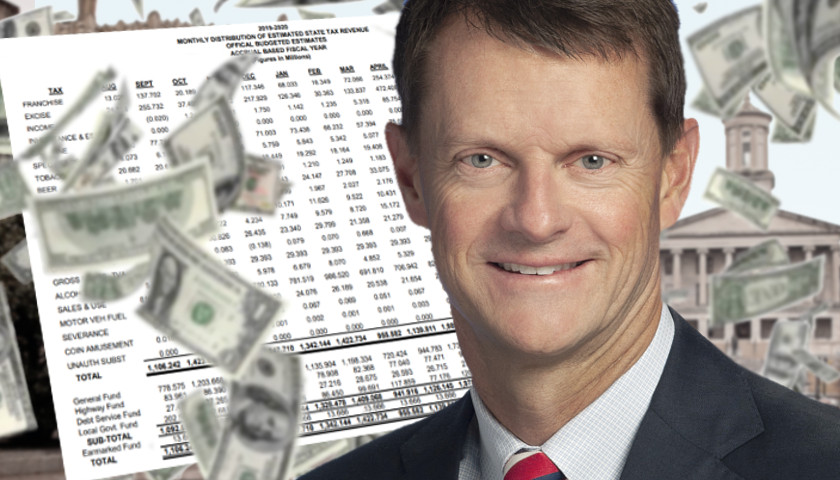In the monthly announcement of state revenues, Tennessee Department of Finance and Administration Commissioner Stuart McWhorter reported that collections for December were $55.3 million more than the budgeted estimate.
December revenue collections exceeded the budget for the month by 4.12 percent, reflecting 4.87 percent growth over December 2018, marking the fifth month in a row for a surplus.
The state’s budget surplus through December is up to $351.1 million, or 5.86 percent over the budgeted estimate and 7.66 percent ahead of the same period last fiscal year.
Commissioner McWhorter attributed the strong collections in December to the state’s two highest sources of revenue.
“Total revenues exceeded budget estimates in December primarily due to continued strong sales and corporate tax receipts,” said McWhorter in the statement.
Sales and use tax, the state’s largest revenue source, was $19.6 million or 2.51 percent over budget, which Commissioner McWhorter said was due in part to the start of the Christmas shopping season.
“December sales tax revenues reflect November retail activity, which includes Black Friday and after-Thanksgiving sales.”
Commissioner McWhorter also pointed out, “January’s revenue report will capture consumer spending for the remainder of the Christmas holiday season.”
Year-to-date, sales and use tax collections are $123 million or 3.13 percent over budget and $213 million or 5.54 percent ahead of the same time last fiscal year.
Meanwhile, the state’s second largest revenue source – franchise and excise tax – was $29.7 million or 8.84 percent over budget.
Franchise and excise tax collections are $151.8 million or 17.69 percent over budget and similarly ahead of the same period last year.
Two other major contributors to December’s surplus include the privilege tax at $3 million or 13.16 percent over budget and the gasoline tax at $2.7 million or 3.8 percent over budget.
The professional privilege tax, during the 111th Tennessee General Assembly’s first session, removed 15 professions from the $400 annual tax. The last payment from the 15 professions was due by June 1, 2019, according to the Department of Revenue website.
The fiscal note associated with the legislation removing 15 professions from the privilege tax estimated a recurring net decrease in state revenues of $22.3 million, beginning with the current 2019-2020 fiscal year.
In stark contrast to the prediction, just five months into the fiscal year, the professional privilege tax is actually $21.5 million – 5.32 percent – ahead of the budgeted estimates.
The tobacco tax, motor vehicle registration fee and motor vehicle fuel tax were all off for the month. However, the motor vehicle registration fee and motor vehicle fuel tax are ahead for the year.
As of the end of December, the state’s primary funds are all ahead of the 2019-2020 fiscal year budget as follows:
General Fund – $292.3 million or 6.07 percent
Highway Fund – $36.7 million or 8.87 percent
City & County Fund – $21.3 million or 3.82 percent
Commissioner McWhorter qualifies the information contained in the December revenue news release, “The budgeted revenue estimates for 2019-2020 are based on the State Funding Board’s consensus recommendation of November 26, 2018 and adopted by the first session of the 111th General Assembly in April 2019. Also incorporated in the estimates are any changes in revenue enacted during the 2019 session of the General Assembly.”
The state’s revenue estimates for the 2019-2020 fiscal year can be found here.
The state’s revenue report for December 2019 can be found here.
—
Laura Baigert is a senior reporter at The Tennessee Star.






Maybe it’s about time to take that scam of a gas tax off the backs of the people that live out of town and have to commute to work everyday. Kinda funny that the roads seem to be in the same condition or worse than before the gas tax was enacted.
“In stark contrast to the prediction, just five months into the fiscal year, the professional privilege tax is actually $21.5 million – 5.32 percent – ahead of the budgeted estimates.” So, the State charges a “privilege tax” to allow people to do business in the State, yet the State collects the benefits through “sales taxes” on the goods and services produced or performed. Maybe government should stop playing games using euphemisms to sugar coat things, and just start reducing all the regulations!
JFK, Reagan and Trump were right, cut regulations and the associated taxes, then, businesses flourish, AND, tax revenues go up. How many times does government have to relearn this lesson?
Either reduce the sales tax & fuel tax or expedite road repair. Both should be priority #1.